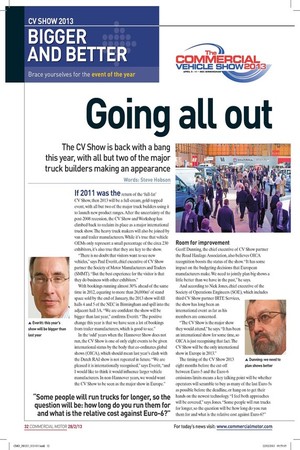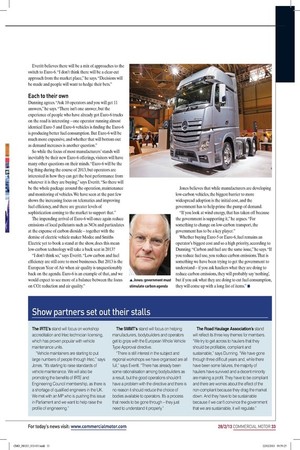Going all out
Page 23

Page 24

If you've noticed an error in this article please click here to report it so we can fix it.
The CV Show is back with a bang this year, with all but two of the major truck builders making an appearance Words: Steve Hobson If 2011 was the return of the `full-fat' CV Show, then 2013 will be a full-cream, gold-topped event, with all but two of the major truck builders using it to launch new product ranges. After the uncertainty of the post-2008 recession, the CV Show and Workshop has climbed back to reclaim its place as a major international truck show. The heavy truck makers will also be joined by van and trailer manufacturers. While it's true that vehicle OEMs only represent a small percentage of the circa 230 exhibitors, it's also true that they are key to the show.
"There is no doubt that visitors want to see new vehicles," says Paul Everitt, chief executive of CV Show partner the Society of Motor Manufacturers and Traders (SMMT). "But the best experience for the visitor is that they do business with other exhibitors."
With bookings running almost 30% ahead of the same time in 2012, equating to more than 26,000m2 of stand space sold by the end of January, the 2013 show will fill halls 4 and 5 of the NEC in Birmingham and spill into the adjacent hall 3A. "We are confident the show will be bigger than last year," confirms Everitt. "The positive change this year is that we have seen a lot of bookings from trailer manufacturers, which is good to see."
In the 'odd' years when the Hannover Show does not run, the CV Show is one of only eight events to be given international status by the body that co-ordinates global shows (OICA), which should mean last year's clash with the Dutch RAT show is not repeated in future. "We are pleased it is internationally recognised," says Everitt, "and I would like to think it would influence larger vehicle manufacturers. In non-Hannover years, we would want the CV Show to be seen as the major show in Europe."
Room for improvement Geoff Dunning, the chief executive of CV Show partner the Road Haulage Association, also believes OICA recognition boosts the status of the show. "It has some impact on the budgeting decisions that European manufacturers make. We need to jointly plan big shows a little better than we have in the past," he says.
"The CV Show is the major show they would attend," he says. "It has been an international show for some time, so OICA is just recognising that fact. The CV Show will be the only international show in Europe in 2013."
The timing of the CV Show 2013 eight months before the cut-off between Euro-5 and the Euro-6 emissions limits means a key talking point will be whether operators will scramble to buy as many of the last Euro-5s as possible before the deadline, or hang on to get their hands on the newest technology. "I feel both approaches will be covered," says Jones. "Some people will run trucks for longer, so the question will be: how long do you run them for and what is the relative cost against Euro-6?"
Everitt believes there will be a mix of approaches to the switch to Euro-6. "I don't think there will be a clear-cut approach from the market place," he says. "Decisions will be made and people will want to hedge their bets."
Each to their own Dunning agrees. "Ask 10 operators and you will get 11 answers," he says. "There isn't one answer, but the experience of people who have already got Euro-6 trucks on the road is interesting — one operator running almost identical Euro-5 and Euro-6 vehicles is finding the Euro-6 is producing better fuel consumption. But Euro-6 will be much more expensive, and whether that will bottom out as demand increases is another question."
So while the focus of most manufacturers' stands will inevitably be their new Euro-6 offerings, visitors will have many other questions on their minds. "Euro-6 will be the big thing during the course of 2013, but operators are interested in how they can get the best performance from whatever it is they are buying," says Everitt. "So there will be the whole package around the operation, maintenance and monitoring of vehicles. We have seen at the past few shows the increasing focus on telematics and improving fuel efficiency, and there are greater levels of sophistication coming to the market to support that."
The impending arrival of Euro-6 will once again reduce emissions of local pollutants such as NOx and particulates at the expense of carbon dioxide — together with the demise of electric vehicle maker Modec and Smiths Electric yet to book a stand at the show, does this mean low-carbon technology will take a back seat in 2013?
"I don't think so," says Everitt. "Low carbon and fuel efficiency are still core to most businesses. But 2013 is the European Year of Air when air quality is unquestionably back on the agenda. Euro-6 is an example of that, and we would expect to see more of a balance between the focus on CO2 reduction and air quality."
Jones believes that while manufacturers are developing low-carbon vehicles, the biggest barrier to more widespread adoption is the initial cost, and the government has to help prime the pump of demand.
"If you look at wind energy, that has taken off because the government is supporting it," he argues. "For something to change on low-carbon transport, the government has to be a key player."
Whether buying Euro-5 or Euro-6, fuel remains an operator's biggest cost and so a high priority, according to Dunning. "Carbon and fuel are the same issue," he says. "If you reduce fuel use, you reduce carbon emissions. That is something we have been trying to get the government to understand — if you ask hauliers what they are doing to reduce carbon emissions, they will probably say 'nothing', but if you ask what they are doing to cut fuel consumption, they will come up with a long list of items." • Show partners set out their stalls The IRTE's stand will focus on workshop accreditation and Irtec technician licensing, which has proven popular with vehicle maintenance units.
"Vehicle maintainers are starting to put large numbers of people through Irtec," says Jones. "It's starting to raise standards of vehicle maintenance. We will also be promoting the benefits of IRTE and Engineering Council membership, as there is a shortage of qualified engineers in the UK. We met with an MP who is pushing this issue in Parliament and we want to help raise the profile of engineering."
The SMMT's stand will focus on helping manufacturers, bodybuilders and operators get to grips with the European Whole Vehicle Type Approval directive.
"There is still interest in the subject and regional workshops we have organised are all full," says Everitt. "There has already been some rationalisation among bodybuilders as a result, but the good operations shouldn't have a problem with the directive and there is no reason it should reduce the choice of bodies available to operators. It's a process that needs to be gone through — they just need to understand it properly."
The Road Haulage Association's stand will reflect its three key themes for members. "We try to get across to hauliers that they should be profitable, compliant and sustainable," says Dunning. "We have gone through three difficult years and, while there have been some failures, the majority of hauliers have survived and a decent minority are making a profit. They have to be compliant and there are worries about the effect of the non-compliant because they drag the market down. And they have to be sustainable because if we can't convince the government that we are sustainable, it will regulate."







































